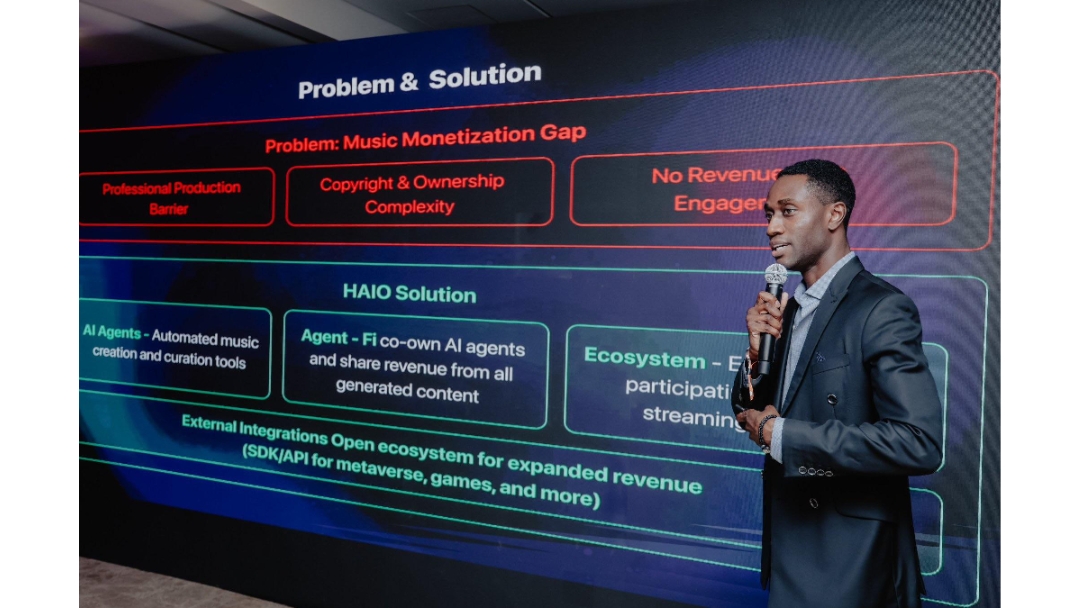For those new to the space, how would you describe HAiO in one sentence? And why is this the right moment for something like HAiO to exist?
HAiO is an AI-powered music platform that lets anyone create music instantly, own it, and earn from it—even if they’ve never made music before.
Right now, we’re seeing a wave of interest in AI tools, but most of them are either too technical or built for passive use. At the same time, there’s growing frustration with how creative work is valued and shared in the traditional music industry. HAiO exists to change that. It gives everyday people the ability to participate in the creative process, take ownership of what they make, and get rewarded for it. It’s designed for this moment—where people want more control, more creativity, and more upside.
There are plenty of music platforms using AI or Web3. What makes HAiO genuinely different?
Most platforms focus on one piece of the puzzle. Some help you generate music. Others tokenize songs. Some offer rewards, but only for professional artists. HAiO is different because it combines creation, ownership, and earning in a way that’s accessible to everyone. You don’t need to be a musician, you don’t need to understand crypto, and you don’t need a following.
The platform is built around intelligent AI agents that do the heavy lifting. And everything is designed with one goal in mind: to turn passive music listeners into active participants in the future of music.
HAiO is designed to help everyday users create, own, and earn from music. How does that actually work in practice, and how is it better than the current streaming or royalty systems?
On HAiO, you can generate a playlist with just a few clicks. Once it’s created, you can claim it as your own and use it however you want—or let it live on the platform to earn rewards through play counts, challenges, and other gamified systems we’ve built in.
Instead of waiting for royalties that may never come or splitting value with dozens of middlemen, HAiO puts the ownership directly in the user’s hands. It’s a more transparent, direct, and fair model. And since everything is tracked on-chain, you always know exactly what you own and what it’s earning.

You’ve built HAiO around interactive AI “Agents.” Can you break down what these Agents do and why they matter?
The AI Agents are like smart assistants that help you engage with music in ways that weren’t possible before. There’s a Music Agent that is currently generating 1000 tracks per day. A Playlist Agent that helps you curate music. A Live Agent that connects you to real-time performances and audience feedback.
These agents are central to the platform because they remove the traditional barriers to creation and discovery. You don’t need technical skill. You don’t need to scroll endlessly. You just interact with the agent and start creating or exploring instantly.
And beyond users, HAiO is also a new playground for builders. Creators can monetize through playlists, channels, and leaderboards. Developers can plug into our AI infrastructure to build new use cases via SDK and APIs — from games to branded music apps. It’s not just about what HAiO offers today, but what others can build on top of it tomorrow.
You recently ran a beta campaign that brought in thousands of users. What did you learn from that, and how is user input shaping the future of HAiO?
The beta taught us that people are ready to be part of something new. We had thousands of users from all over the world join in, test features, and give feedback. Some of them had never made music before, and they were excited by how fast and easy it was. Others gave us critical feedback that helped us tighten the product.
We’re building HAiO with the community, not just for it. That input is shaping our roadmap, from feature prioritization to how we design rewards. It also confirmed that there’s a real appetite for AI tools that feel fun, useful, and empowering—not overwhelming or overly technical.
What are some of the next major features or releases on the roadmap—and how do they change what HAiO users can do?
The biggest additions coming up are Channel Pages and the DJ Leaderboard. Channels will allow users to create and manage their own music spaces—whether it’s for a vibe, a theme, or a community. It gives people a home for their content and audience.
The DJ Leaderboard turns music creation and engagement into a game. The more your music gets played, saved, or used by others, the more you climb the ranks. It’s part of our strategy to make HAiO feel like a living music economy—not just a place to make tracks.
HAiO has hinted at deeper integration into entertainment, gaming, and advertising. What’s your long-term strategy for connecting music with these other industries?
We see music as the entry point into a much larger creative ecosystem. Once people start creating music with AI, they naturally want to use it in other formats—videos, games, virtual worlds, social content. We want to make that seamless.
HAiO’s long-term strategy is to become the backbone for AI-generated sound in entertainment. Whether it’s background music in a game, a custom soundtrack for an ad, or a dynamic audio layer in the metaverse, HAiO can power it. We’re already speaking with partners in those spaces, and we’re building the tools to scale into them.
Looking ahead three years, where do you see HAiO? What kind of impact are you hoping to make—both in the industry and culturally?
Three years from now, I want HAiO to be the platform where the next generation of creators got their start. A place where people felt like they could experiment, express themselves, and actually benefit from their creativity—no matter their background or skill level.
Culturally, I hope we play a role in shifting people’s relationship with music. Not just as something you consume, but as something you own, shape, and share. Industry-wise, we want to prove that AI and blockchain don’t replace artists—they open the door to millions more.





























